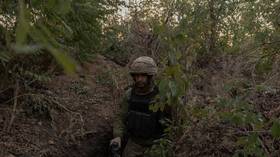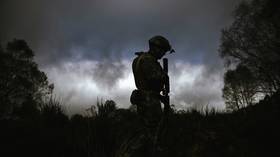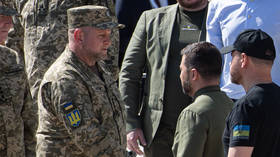End ‘magical thinking’ about defeating Russia – US experts

Western leaders must give up their “magical thinking” about defeating Russia in Ukraine, two analysts from the Carnegie Endowment for International Peace have claimed in an essay published by the Wall Street Journal.
The Washington think tank’s authors, Eugene Rumer and Andrew Weiss, wrote on Thursday that, contrary to the hopes of Western officials who speculated that Russian President Vladimir Putin would be ousted in a “palace coup,” Moscow has maintained popular support for its Ukraine strategy while overcoming efforts to cripple its economy.
Officials in the West “have indulged all too often in magical thinking – betting on sanctions, a successful Ukrainian counteroffensive or the transfer of new types of weapons to force the Kremlin to come to the negotiating table.”
“What Western leaders conspicuously haven’t done is level with their publics about the enduring nature of the threat from an emboldened, revisionist Russia,” they noted.
“More than six months before the full-scale invasion of Ukraine in February 2022, Putin signed off on a new national security strategy for Russia,” they claimed.
“The main thrust of that document was to prepare the country for a long-term confrontation with the West. Today, Putin can tell the nation that his strategy is working.”
Although Rumer and Weiss claimed that “none of this should come as a surprise,” the publication of the piece marks a continuation of a new, more critical trend in mainstream US media regarding Ukraine’s prospects in its conflict with Russia.
The tone has shifted amid widespread recognition that Ukrainian President Vladimir Zelensky faces wavering allies, enormous casualties, and growing fissures within his leadership team.
One of the most somber articles was posted late last month by Time magazine, which had named Zelensky its “person of the year” just last December. “Exhaustion with the war rolls along like a wave,” Zelensky told the publication, referring to the sharp decrease in Western enthusiasm for the Ukrainian cause.
Speaking to The Economist earlier this month, Valery Zaluzhny, Kiev’s top general, admitted that the situation on the battlefront had reached “a stalemate.”
There are no indications that Russia is losing the conflict, which has become a “war of attrition,” Rumer and Weiss conclude.
Putin’s position has only strengthened, and Russian defense contractors are outperforming their Western counterparts in producing weaponry. The Russian economy has withstood US-led sanctions, they said.
“The technocrats responsible for running the Russian economy have proven themselves to be resilient, adaptable, and resourceful,” the two analysts said. “Elevated oil prices, driven in part by close cooperation with Saudi Arabia, are refilling state coffers. Ukraine, by contrast, depends heavily on infusions of Western cash.”
Weiss and Rumer called for a shift to a long-term containment strategy because “there should be no illusions that any possible combination of short-term steps will be sufficient to force Putin to abandon his war.” The new strategy would involve continuing Western sanctions, isolating Russia diplomatically, and strengthening NATO defense capabilities, as well as “mitigating all of the damage – diplomatic, informational, military and economic” – caused by the war.
The op-ed stressed that Western leaders had used a similarly long-term approach during the Cold War, rather than unrealistically betting on an “overnight collapse of the Soviet system.” However, the analysts advised against fighting another Cold War.
“Embarking on a global competition with the Kremlin would not be a wise investment of US prestige or resources. It would consign us to a pointless game of whack-a-mole against any and all manifestations of Russian influence,” wrote Rumer and Weiss.














